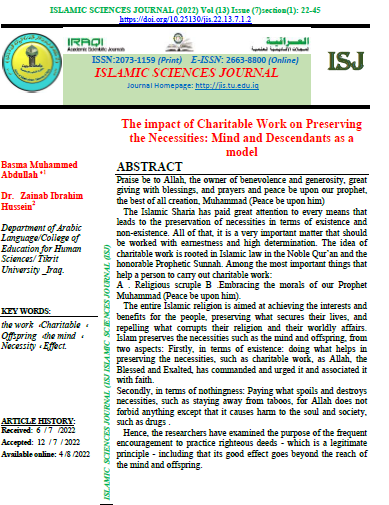The impact of Charitable Work on Preserving the Necessities: Mind and Descendants as a model
Main Article Content
Abstract
Praise be to Allah, the owner of benevolence and generosity, great giving with blessings, and prayers and peace be upon our prophet, the best of all creation, Muhammad (Peace be upon him)
The Islamic Sharia has paid great attention to every means that leads to the preservation of necessities in terms of existence and non-existence. All of that, it is a very important matter that should be worked with earnestness and high determination. The idea of charitable work is rooted in Islamic law in the Noble Qur’an and the honorable Prophetic Sunnah. Among the most important things that help a person to carry out charitable work:
A . Religious scruple B. Embracing the morals of our Prophet Muhammad (Peace be upon him).
The entire Islamic religion is aimed at achieving the interests and benefits for the people, preserving what secures their lives, and repelling what corrupts their religion and their worldly affairs. Islam preserves the necessities such as the mind and offspring, from two aspects: Firstly, in terms of existence: doing what helps in preserving the necessities, such as charitable work, as Allah, the Blessed and Exalted, has commanded and urged it and associated it with faith.
Secondly, in terms of nothingness: Paying what spoils and destroys necessities, such as staying away from taboos, for Allah does not forbid anything except that it causes harm to the soul and society, such as drugs.
Hence, the researchers have examined the purpose of the frequent encouragement to practice righteous deeds - which is a legitimate principle - including that its good effect goes beyond the reach of the mind and offspring.
Article Details

This work is licensed under a Creative Commons Attribution 4.0 International License.
COLLEGE OF ISLAMIC SCIENCES, TIKRIT UNIVERSITY. THIS IS AN OPEN ACCESS ARTICLE UNDER THE CC BY LICENSE http://creativecommons.org/licenses/by/4.0/

